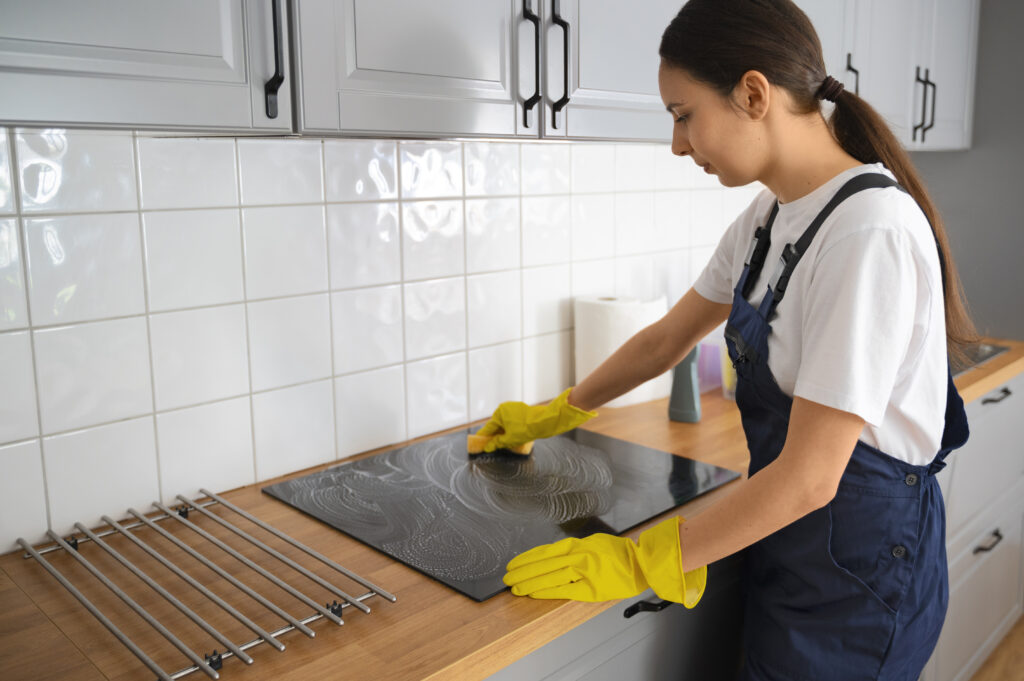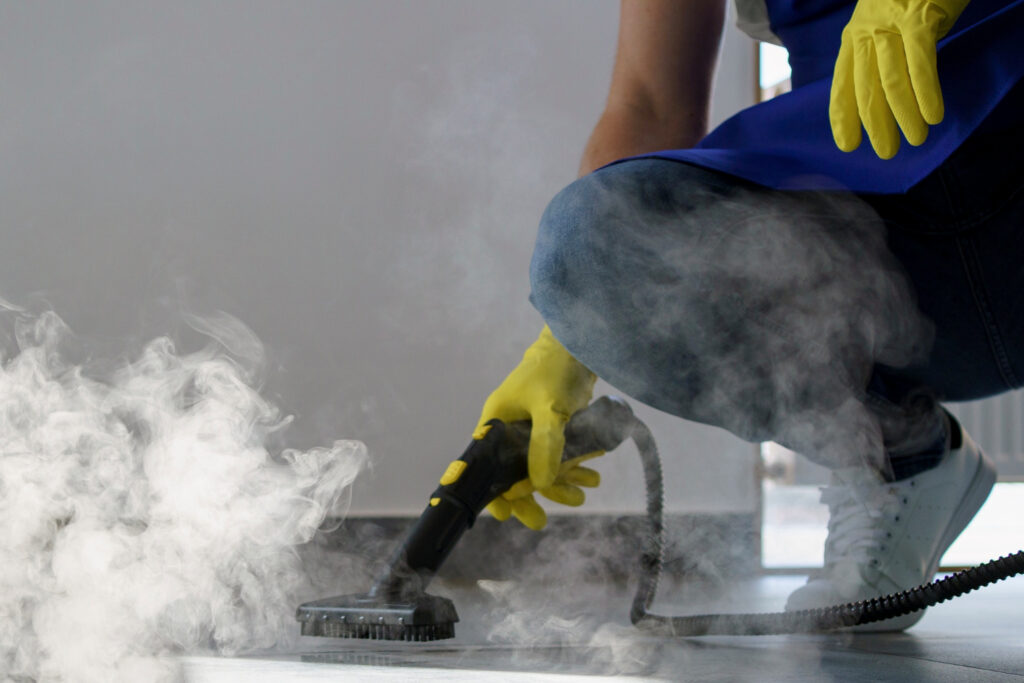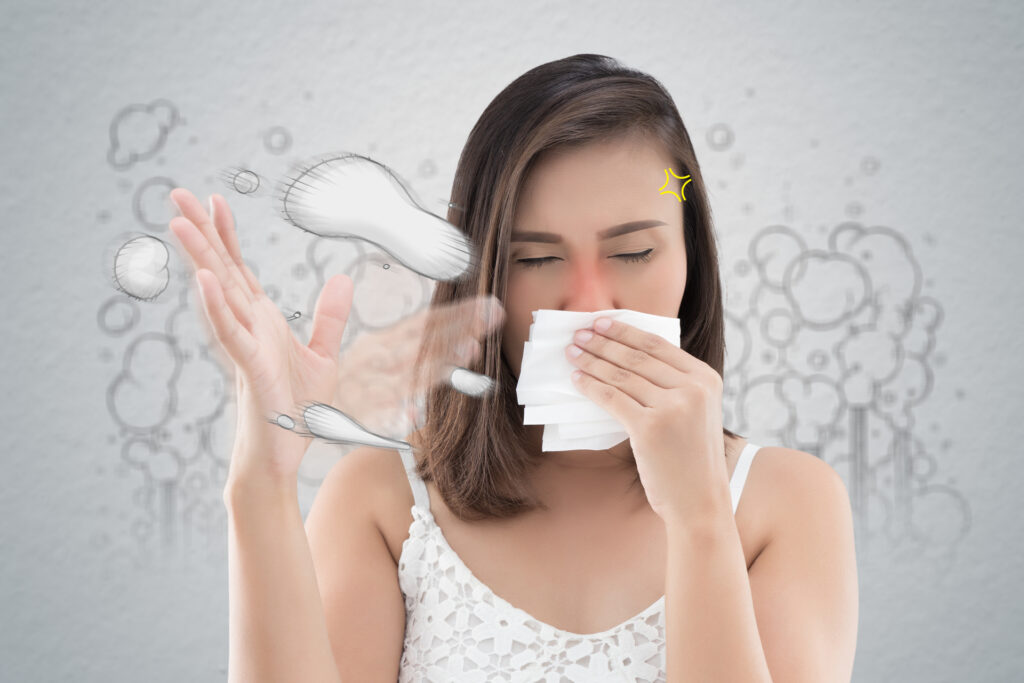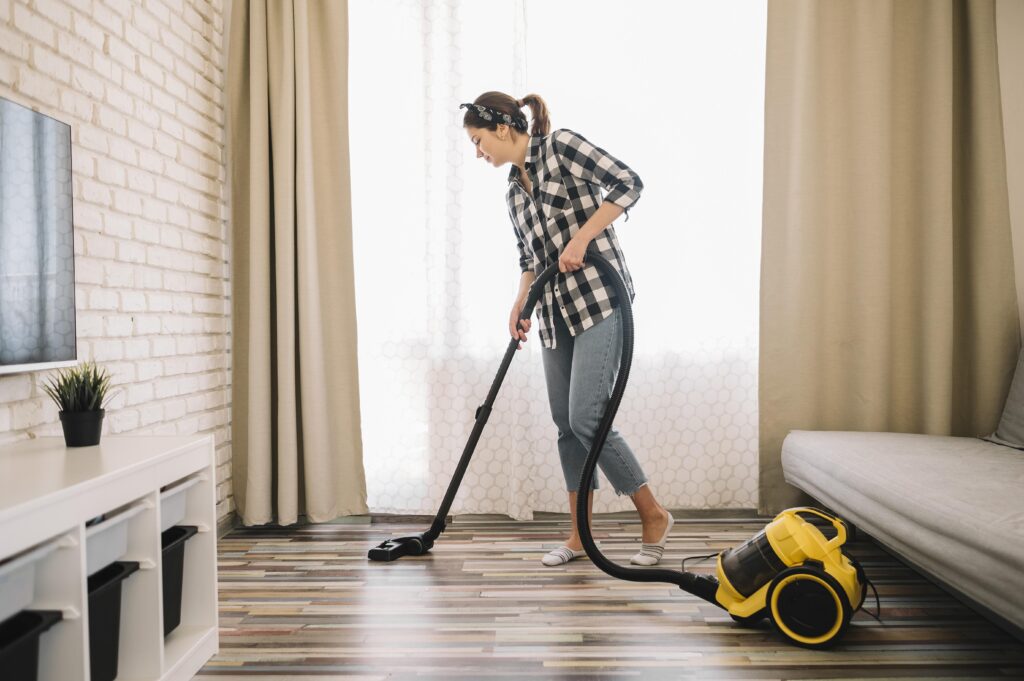Did you know the air inside your home or office can be 100 times more polluted than outside? The Environmental Protection Agency (EPA) says this is true for many of us. It can really harm our health.
Indoor air quality is key because we’re inside a lot. Bad air can cause breathing problems and allergies. Deep cleaning helps by getting rid of dust, dirt, and pollutants that make these issues worse.

Choosing professional cleaning services like Shalean Cleaning Services can greatly reduce indoor air pollutants. This means you get cleaner air. It’s better for your health and makes your space more comfortable.
The Hidden Dangers of Poor Indoor Air Quality
Did you know your home might have pollutants that harm your air quality? Indoor air pollution is a big problem in South Africa. The climate and household items can make it worse.
Common Indoor Air Pollutants in South African Homes
In South African homes, you’ll find pollutants like radon, formaldehyde, and volatile organic compounds (VOCs). These come from building materials, household products, and furniture.

Radon is a gas that comes from the soil. Formaldehyde is in adhesives and wood products. VOCs are in cleaning products, paints, and air fresheners.
- Radon: enters homes through soil and building materials
- Formaldehyde: found in adhesives, resins, and certain wood products
- VOCs: emitted by household items like cleaning products and air fresheners
Health Risks Associated with Indoor Air Pollution
Being around these pollutants can harm your health. Respiratory issues are common, from mild irritation to asthma. Long-term exposure can lead to cancer and other diseases.
People most at risk are children, the elderly, and those with health problems.
- Respiratory problems: irritation, asthma, and other chronic conditions
- Cancer risks: long-term exposure to certain pollutants
- Vulnerable populations: children, elderly, and those with pre-existing conditions
Understanding the Connection Between Cleanliness and Air Quality
You might not realize how cleanliness affects the air you breathe indoors. The link between cleanliness and air quality is complex. It involves many factors that affect the air you and your family breathe every day.
How Dust and Allergens Affect Your Breathing
Dust and allergens are common indoor air pollutants. They can harm your respiratory health. When dust particles and allergens become airborne, they can be inhaled deep into your lungs. This can worsen conditions like asthma and allergies.

Regular exposure to these pollutants can lead to chronic respiratory issues. It’s vital to keep your indoor environment clean.
In South African homes, dust and allergens can build up quickly. This is due to high humidity and inadequate ventilation. This buildup is a big problem in homes with pets or family members with allergies.
The Science Behind Indoor Air Pollution in South African Climate
The South African climate affects indoor air quality. High humidity can cause mold growth. Inadequate ventilation can trap pollutants indoors. It’s important to understand these factors to fight indoor air pollution.
- Humidity levels can affect mold growth and dust mite populations.
- Inadequate ventilation can lead to the accumulation of indoor air pollutants.
- Climate-specific factors should be considered when addressing indoor air quality.
By grasping the science behind indoor air pollution, you can improve your indoor air quality. This means more than just regular cleaning. It also involves tackling specific challenges from the South African climate.
Why Deep Cleaning is Essential for Healthier Indoor Air
To breathe easier, it’s key to go beyond regular cleaning. Deep cleaning services are vital. Regular cleaning keeps your home tidy, but deep cleaning targets hidden dirt and allergens that harm your air quality.

Deep cleaning is more detailed than regular cleaning. It focuses on areas often missed, like behind appliances and inside cabinets. It also cleans within HVAC systems.
Regular Cleaning vs. Deep Cleaning: Key Differences
It’s important to know the difference between regular and deep cleaning. Regular cleaning includes daily tasks like vacuuming and dusting. Deep cleaning, on the other hand, is a deeper, more thorough process that needs special tools and techniques.
- Regular cleaning maintains surface cleanliness.
- Deep cleaning targets hidden dirt and allergens.
- Deep cleaning requires specialized equipment and techniques.
Why Standard Cleaning Isn’t Enough for Air Quality Improvement
Standard cleaning is not enough to improve indoor air quality. It misses hidden sources of pollution. Dust in ducts, allergens in furniture, and pollutants in carpets are often overlooked.
Key areas that standard cleaning misses include:
- Dust accumulation in hard-to-reach areas.
- Allergen buildup in furniture and carpets.
- Pollutants trapped in air ducts and HVAC systems.
Investing in professional deep cleaning services, like Shalean Cleaning Services, ensures a more thorough clean. This directly improves your indoor air quality.
Step-by-Step Deep Cleaning Techniques to Purify Your Indoor Air
To breathe easier, learning deep cleaning techniques is key. These methods remove dust, allergens, and pollutants from your air. It’s more than just tidying up; it’s a detailed process.
Proper Dusting Methods That Capture Instead of Spread Particles
Dusting is vital for clean air. But, if done wrong, it can spread dust. Use a damp cloth to dust surfaces. This traps dust, keeping it from flying around.
Start dusting from the top to avoid dusting clean areas again. Focus on furniture and fixtures where dust builds up. Be gentle; avoid rubbing too hard to prevent dust from flying.
Effective Vacuuming Strategies for Allergen Removal
Vacuuming is essential for air purification. Choose a vacuum with a HEPA filter. It catches 99.97% of particles, including dust and pollen.
Vacuum slowly and carefully to pick up as much as possible. Use the right attachments for different areas. Empty the vacuum and clean or replace the filter often to keep it working well.
Steam Cleaning for Deeper Sanitization
Steam cleaning is great for sanitizing. It uses hot steam to remove dirt and kill germs on surfaces. It works well on hard floors, upholstery, and mattresses.
Use a steam cleaner with a controlled temperature to avoid damage. Move it slowly to let the steam work. For upholstery and mattresses, use a gentler setting and test a small area first.
By using these deep cleaning techniques regularly, you can greatly improve your air quality. Deep cleaning, along with maintenance, keeps your air clean and your home healthy.
Room-by-Room Deep Cleaning Guide for Better Air Quality
To get better air inside, clean each room deeply. Every room has its own cleaning needs. By tackling these needs, you can make your air cleaner.
Bedrooms: Tackling Dust Mites and Allergens
Bedrooms are hotspots for dust mites and allergens. Start by washing your bedding in hot water every week. Use a hypoallergenic mattress cover and wash it often. When dusting, use a damp cloth to catch dust, and avoid dry dusting to prevent allergens from spreading.
Use a vacuum with a HEPA filter to clean your bedroom. Focus on areas around beds and furniture.
Living Areas: Addressing Hidden Dust Reservoirs
Living areas collect dust and dirt, often around furniture and electronics. Use a microfiber cloth to dust, and don’t forget light fixtures and ceiling fans. Vacuum floors with a HEPA filter to catch dust and allergens.
- Dust and clean furniture, including upholstered furniture and wooden surfaces.
- Organize clutter and remove unnecessary items.
- Use an air purifier to cut down on airborne pollutants.
Kitchens: Eliminating Cooking Pollutants and Grease
Kitchens need extra care because of cooking pollutants and grease. Make sure your kitchen is well-ventilated with an exhaust fan while cooking. Clean your oven, stove, and fridge regularly to stop grease buildup.
- Wipe down kitchen surfaces with a degreaser to remove grease and food.
- Change your kitchen’s air filters often.
- Use a microfiber cloth to dust and clean kitchen cabinets.
Bathrooms: Preventing Mold and Mildew Growth
Bathrooms are at risk for mold and mildew because of moisture. Use an exhaust fan during and after showers to keep air moving. Clean bathroom surfaces with a mold-killing cleaner, focusing on areas around showers, sinks, and toilets.
Fix leaks right away, and think about using a dehumidifier to lower moisture in your bathroom.
Tackling Hidden Sources of Indoor Air Pollution
There are hidden sources of indoor air pollution in your home. These can harm the air you breathe. It’s key to find and fix these issues to make your air cleaner.
Cleaning Air Ducts and HVAC Systems
Your HVAC system and air ducts are important for air flow. If they’re dirty, they can spread bad stuff. It’s important to clean them regularly to keep air clean.
- Look for dirt, dust, or mold in your air ducts and HVAC system.
- Use a strong vacuum to clean them out.
- Think about getting a pro to check and clean your HVAC system every year.
Addressing Mold and Moisture Issues Common in South African Homes
Mold and moisture are big problems in South African homes. Mold can hide in places like walls and crawl spaces. To fix these issues, find and fix the moisture problem, then clean and disinfect.
- Look for water damage or leaks in your home.
- Use a dehumidifier to lower moisture, mainly in damp areas.
- Make sure your home has good air flow, like in bathrooms and kitchens.
Managing Pet Dander and Related Allergens
Pets bring joy but also dander, which can make allergies worse. Regular grooming and cleaning can help lessen pet dander.
- Brush your pets often to cut down on shedding.
- Vacuum a lot with a vacuum that has a HEPA filter.
- Wash your pets’ bedding often to stop dander from building up.
By dealing with these hidden air pollution sources, you can make your home’s air much better. This creates a healthier space for you and your family.
How Shalean Cleaning Services’ Professional Deep Cleaning Transforms Your Air Quality
Discover how Shalean Cleaning Services’ deep cleaning boosts your indoor air quality. We know how vital a clean home is, thanks to South Africa’s climate.
Our team is committed to cleaning that looks great and feels fresh. Our air quality-focused cleaning targets pollution at its source. This makes your home a healthier place for everyone.
Our Specialized Air Quality-Focused Cleaning Process
We tailor our cleaning to fit your home’s needs. First, we check where dirt and dust build up most. Then, we use professional-grade equipment to clean every corner deeply.
- Comprehensive assessment of your home’s cleaning needs
- Targeted deep cleaning of high-traffic areas and dust-prone surfaces
- Utilization of advanced techniques and professional-grade equipment
Professional-Grade Equipment and Solutions We Use
We use the latest tech and top cleaning solutions. Our professional-grade equipment catches 99.97% of pollutants. This makes your air much cleaner.
- HEPA-filter vacuum cleaners for superior dust capture
- Advanced steam cleaning machines for deep sanitization
- Eco-friendly cleaning solutions that are safe for your family and the environment
Real Results: Before and After Air Quality Measurements
Our clients have seen real improvements in air quality. We measure before and after to show our results. They’ve noticed fewer allergies and better breathing.
Choosing Shalean Cleaning Services means a healthier home. Our services are made for you, ensuring your home is a clean, comfortable space.
Maintaining Cleaner Air Between Professional Deep Cleanings
To keep your home air clean, use several strategies between deep cleanings. Regular upkeep is key to stop dust, allergens, and pollutants. These can harm your indoor air quality.
Daily and Weekly Maintenance Tips
Start with simple daily habits to clean your indoor air. Make your bed every morning to fight dust mites. Use a damp cloth when dusting to avoid spreading particles.
Regular vacuuming with a HEPA-filter vacuum can cut down allergens and dust. This makes a big difference.
For better air, do weekly tasks too. Change your bedding weekly to fight dust mites and allergens. Clean kitchen surfaces and sinks to get rid of grease and pests.
Make sure trash cans are covered and clean often. This keeps pests away and prevents bad smells.
Seasonal Cleaning Considerations for South African Climate
South Africa’s weather changes a lot. Winters are mild, and summers are hot and humid. Watch for mold and mildew in bathrooms and kitchens during hot seasons. Use exhaust fans to lower humidity.
In winter, dry air is common. Using a humidifier can help. But clean it often to stop bacteria.
Complementary Strategies: Ventilation, Purifiers, and Plants
There are more ways to improve your indoor air. Open windows for fresh air when it’s clean outside. Installing vents or whole-house fans helps air move better.
Think about air purifiers, too. They’re good for rooms you spend a lot of time in. Choose ones with HEPA filters and activated carbon for best results.
Indoor plants are also great. Spider plants, snake plants, and peace lilies clean the air naturally. Just keep them healthy and watered to avoid moisture problems.
Conclusion: Breathe Easier with Shalean Cleaning Services
Deep cleaning is key to better indoor air. Shalean Cleaning Services helps a lot. They make your home healthier for you and your family.
Shalean uses top-notch cleaning methods and tools. They get rid of dust, allergens, and pollutants. This makes your home cleaner and healthier.
To keep the air clean, follow some simple tips. Do daily and weekly cleaning, and clean seasonally. Also, use air purifiers and plants. These steps help you breathe easier and live in a healthier home.
Choosing Shalean Cleaning Services is a smart move for a healthier future. Book your deep cleaning today. Start enjoying improved indoor air quality right away.
FAQ
What are the most common indoor air pollutants found in South African homes?
In South African homes, common air pollutants include dust, allergens, and mold. Pet dander, volatile organic compounds (VOCs), and pollutants from cooking and heating systems are also present.
How does poor indoor air quality affect health?
Poor air quality can cause health issues like respiratory problems and allergies. It can also lead to asthma and other heart diseases. Long-term exposure worsens these conditions.
What is the difference between regular cleaning and deep cleaning?
Regular cleaning focuses on making surfaces clean. Deep cleaning, on the other hand, targets hidden dirt and pollutants. It offers a deeper clean that improves air quality.
How often should I deep clean my home to maintain good indoor air quality?
Deep cleaning frequency varies based on home size, occupants, and health concerns. It’s recommended to deep clean at least once or twice a year.
Can I improve indoor air quality without professional help?
Yes, you can improve air quality with daily and weekly tasks like dusting and vacuuming. Professional deep cleaning offers a more thorough solution.
What are some effective methods for removing allergens and dust from my home?
Effective methods include using HEPA-filter vacuums and damp dusting. Steam cleaning also sanitizes surfaces and removes deep-seated dirt and allergens.
How can I reduce moisture and prevent mold growth in my home?
Reduce moisture by ensuring good ventilation and fixing leaks quickly. Use exhaust fans in kitchens and bathrooms. Consider a dehumidifier in humid areas.
Are air purifiers effective in improving indoor air quality?
Yes, air purifiers can remove airborne pollutants and allergens. They work best when used with ventilation and regular cleaning.
How can Shalean Cleaning Services help improve my indoor air quality?
Shalean Cleaning Services offers professional deep cleaning. They use specialized equipment to remove pollutants, improving air quality and health.
What are some complementary strategies to enhance indoor air quality beside deep cleaning?
Strategies include ensuring ventilation, using air purifiers, and adding indoor plants. Maintaining a cleaning schedule also helps prevent pollutant buildup.






